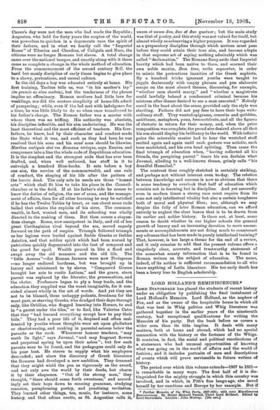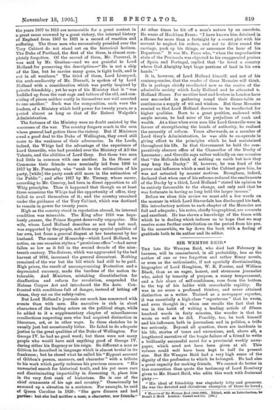LORD HOLLAND'S REMINISCENCES.*
LORD STANORDALE has placed the students of recent history under an obligation by publishing the final instalment of Lord Holland's Memoirs. Lord Holland, as the nephew of Fox, and as the owner of the hospitable house in which all that was best in Whig politics and Whig literature was gathered together in the earlier years of the nineteenth century, had exceptional qualifications for writing the Memoirs of his party. But the book before us covers a wider area than its title implies. It deals with many matters, both at home and abroad, which had no special connection with the history or the fortunes of the Whigs. It contains, in fact, the social and political recollections of a statesman who had unusual opportunities of knowing what was going on in the world of affairs and the world of fashion ; and it includes portraits of men and descriptions of events which will prove serviceable to future writers of history.
The period over which this volume extends-1807 to 1821— is remarkable in many ways. The first half of it is dis- tinguished for the mighty struggle in which this country was involved, and in which, in Pitt's fine langu age, she saved herself by her exertions and Europe by her example. But if
• Purthar. Memoirs of the Whig Party, /8074821; with some Miscellaneous Reminiscences. , By Henry Richard Vaseall, Third Lord Holland. Edited by Lord Stavordale, London John Murray. [18s. net.]
the years 1807 to 1815 are memorable for a great contest in a great cause crowned by a great victory, the internal history of England from 1807 to 1821 is a record of reaction and suffering. The three men who successively presided over the Tory Cabinet do not stand out on the historical horizon. The Duke of Portland, the first of the three, is almost com- pletely forgotten. Of the second of them, Mr. Percaval, it was said by Mr. Grattan—and we are grateful to Lord Holland for preserving the description—" He is not a ship of the line, but he carries many guns, is tight built, and is out in all weathers." The third of them, Lord Liverpool, the arch-mediocrity of Mr. Disraeli, is spoken of by Lord Holland with a consideration which was partly inspired by private friendship ; yet he says of his Ministry that it "was huddled up from the cast rags and tatters of the old, and con- sisting of pieces neither costly in themselves nor well assorted to one another." Such was the composition, such were the leaders, of a Ministry which held power for twenty years, or a period almost as long as that of Sir Robert Walpole's Administration.
The fortunes of the Ministry were no doubt assisted by the successes of the war. The country forgave much in the men whose general had gotten them the victory. But if Ministers owed a good deal to the Duke of Wellington, they owed still more to the weakness of their adversaries. In the Lords, indeed, the Whigs had the advantage of the experience of Lord Grenville, who had presided over the Ministry of All the Talents, and the abilities of Lord Grey. But these two men had little in common with one another. In the House of Commons their friends were nominally led from 1808 to 1817 by Mr. Ponsonby, who "sunk in the estimation of his party, [while] the party sunk still more in the estimation of the Public" ; and after 1817 by Mr. Tierney, whose career, according to Mr. Creevey, had been in direct opposition to all Whig principles. Thus it happened that though on at least three occasions the Whigs had the opportunity of office, they failed to avail themselves of it; and the country remained under the guidance of the Tory Cabinet, which was destined to remain in power for twenty years.
High as the country stood in reputation abroad, its internal condition was miserable. The King after 1810 was hope- lessly iinsane, the Prince Regent deservedly unpopular. His wife, whom Lord Holland describes as not bad but mad, vas supported by the people, not from any special qualities of her own, but from a general disgust at her treatment by her husband. The cause of Monarchy—which Lord Holland, we notice, on one occasion styles a "pernicious office "—had never fallen so low as it fell in the second decade of the nine- teenth century. The distress, which was aggravated by the bad harvest of 1816, increased the general discontent. Nothing remained of the war but the bill which had still to be paid. High prices, the result of uncompromising Protection and a depreciated currency, made the burdens of the nation in- tolerable. And Ministers, mistaking dissatisfaction for disaffection and reform for revolution, suspended the Habeas Corpus Act and introduced the Six Acts. Con- fronted with conditions full of danger, instead of letting off steam, they sat on the safety-valve.
But Lord Holland's journals are much less concerned with events than with men. His narrative is rich in short characters of the leading actors on the political stage, while he added to it a supplementary chapter of miscellaneous recollections respecting men who had acquired distinction in literature, art, or in other ways. In these sketches he is usually just but occasionally bitter. He failed to do adequate justice to the great qualities of the Duke of Wellington. For George IV. he had no good word; but there were not many people who would have said anything good of George IV. during either his Regency or his reign. So different a man as Gibbon he described in language which is almost brutal in its frankness ; but he closed what he called his "flippant account of Gibbon's person, manners, and character" with a tribute to his work which partly redeems his previous censure. "His unwearied search for historical truth, and his yet more raze and discriminating impartiality in discerning it, place him in the very first rank of historians. He is one of the chief ornaments of his age and country." Occasionally he summed up a situation in a sentence. For example, he said of Queen Caroline in 1820: "She gave dinners and had partier: but she had neithera ease; a character, nor friends." At other times be hit off a man's nature by an anecdote. He wrote of Hookham Frere : "I have known him detained in a House for more than a fortnight by a secret plot with his servant to neglect his orders, and not to drive round the carriage, pack up his things, or announce the hour of his Departure." It was Mr. Frere who, "when the unproductive state of the Peninsula was objected to his exaggerated praises of Spain and Portugal, replied that 'he loved a country where God Almighty kept large portions of land in his own hands.'"
It is, however, of Lord Holland himself, and not of his contemporaries, that the reader of these Memoirs will think. He is perhaps chiefly recollected now as the centre of the admirable society which Lady Holland and he attracted ta Holland House. For no other host and hostess in London have ever succeeded in gathering round their dinner-table so continuous a supply of wit and wisdom. But these Memoirs remind us that Lord Holland deserves to be recollected for higher qualities. Born to a great position, endowed with ample means, he had none of the prejudices of rank and wealth. At a time when even men like Lord Grenville were ía favour of strengthening the hands of authority, he realised the necessity of reform. Years afterwards, as a member of Lord Grey's Administration, he was able to co-operate in giving effect to the principles which he had maintained throughout his life. In that Government he held the com- paratively obscure office of the Chancellor of the Duchy of Lancaster ; and Greville says rather unkindly on one occasion that "the Hollands think of nothing on earth but how they may keep the Duchy." If, however, he was fond of the power and influence which a seat in the Cabinet gave him, he was not actuated by meaner motives. Brougham, indeed, declared that when one of his reforms reduced the emoluments of the Duchy by a third, Lord Holland "stated his opinion to be entirely favourable to the change, and only said that be was fortunate in having so long held the larger income."
Before we close this review we must add a few words on the manner in which Lord Stavordale has discharged his task, His introductory notices to each chapter of the Memoirs are full and adequate ; his notes, chiefly biographical, are accurate and excellent. He has shown a knowledge of the times with which he is dealing which induces us to hope that we may receive some further contribution on the period from his pen. In the meanwhile,- we lay down the book with a feeling of gratitude both to its author and its editor.



































































 Previous page
Previous page